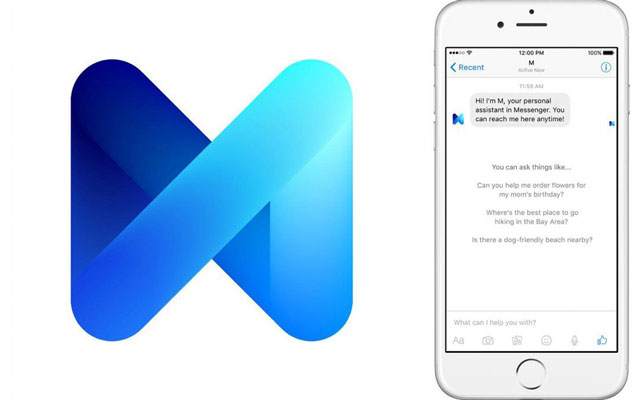 Let’s face it, virtual personal assistants like Siri and Google Now just aren’t very good. Or, to be more accurate, they’re quite good at a narrow set of tasks (like telling you the weather forecast) and quite terrible at anything remotely fuzzy or complex. Now a team at Facebook is working on a new approach: pairing artificial intelligence with human filters.
Let’s face it, virtual personal assistants like Siri and Google Now just aren’t very good. Or, to be more accurate, they’re quite good at a narrow set of tasks (like telling you the weather forecast) and quite terrible at anything remotely fuzzy or complex. Now a team at Facebook is working on a new approach: pairing artificial intelligence with human filters.
Facebook M is a text-based personal assistant that works via Facebook’s enormously popular mobile Messenger application. More than 700m people use Messenger every month — 200m of them use it daily. The interaction model for M is dead simple: you chat to it as though you would a human, and it does its best to fulfil your requests.
But what makes M quite different from other virtual personal assistants is that its responses are filtered through a small team of human “trainers” who nudge it along one of the multiple possible paths that it suggests, and step in to correct it when it strays too far from the path.
This might sound like a complete fraud — a sweatshop of real personal assistants masquerading as artificial intelligence — but the team at Facebook insists that M does the vast majority of the work. The trainers merely steer the ship, but it powers itself.
The core of the team behind M comes from Wit.ai, a start-up focused on building artificial intelligence services, which Facebook acquired in January this year. They have built what they call a “deep neural net”, essentially a computer system that learns over time. This system provides the heavy lifting for M’s artificial intelligence components.
M is currently only available to people based in California, and only by invitation from existing members. The service is very much in its infancy, but if we believe Facebook’s management, it is learning at a dizzying rate.
The technology journalists who have tried the service are generally impressed at how much more flexible and effective it is than competing services Siri and Cortana, even though some of them bemoan M’s total lack of a human-like personality.
Given the size and influence of a company like Facebook, it’s often tricky to separate the PR hype from the substance. So many of its big breakthroughs — Beacon, Deals, Home — have proved to be flops. But M is unusually intriguing and ambitious.
To be really effective, machine learning requires an enormous amount of data from which to learn. Given that Facebook has over 1,5bn users worldwide, the company has access to an almost limitless torrent of the data behind people’s wants and needs.
However, when a service is disappointing or annoying, people simply stop using it. How many people do you know that regularly use Siri? Or Google Now? I’ll bet it’s a tiny handful of die-hards. These services just don’t do what it says on the tin. Or at least they don’t do it quickly and easily enough.
But by pairing the artificial intelligence machines with human trainers (all of whom are university educated) you get a service that’s extremely useful in the short term and has a chance of scaling in the long term.
Facebook M is essentially giving itself a long runway that may allow it to learn enough about human behaviour that its trainers will play an ever smaller role in the process, dealing only with those rare occurrences which computer scientists call “edge cases”. This is essentially synthetic intelligence rather than artificial intelligence — humans and machines working together to produce a unified outcome.
By the looks of things, this isn’t just hype. A journalist at BuzzFeed reports that, over a six week period, M went from being unable to order flowers to suggesting choices based on vague parameters like “not too expensive” and then ordering them on your behalf.

So what’s in it for Facebook? Nothing short of a chance to challenge Google as the first place people go to find information on what products to buy. Because instant messaging is both private and contextual, M remembers everything you’ve ever asked or told it, including your credit card and your Amazon password. That makes transactions dizzyingly easy.
So buying that bunch of flowers goes from a five-minute job that requires fishing out your credit card and typing in a delivery address to a 30-second one: “Hi M, Send another bunch of red roses to Sarah. Around R250 is fine. The card should say ‘Congrats on the promotion hun! Love Dave.’ and it needs to be delivered tomorrow morning.”
At least that’s the dream. Rolling this out in California is one thing, but Johannesburg or Rio would be ever so slightly more challenging. And even David Marcus, who heads up Facebook’s messaging business, admits that “it’s going to be hard work and it’s going to take a long time.”
But Marcus also says: “I think we have a good chance [at scaling], otherwise we wouldn’t be doing it.”
His colleague, Alex Lebrun, who founded Wit.ai is more openly optimistic: “Everything is possible,” he says. “Let’s look at what happens, and when something becomes frequent, the AI will learn to do it, and then it will be scalable.”
We could view this technology as creepy and invasive, and many people will avoid it as a result. And we should always be wary of anything done for purely commercial reasons. But in its quest to challenge Google, Facebook may be advancing the cause of artificial intelligence by decades.
In time, those advances will trickle out into the world and benefit humanity a lot more substantially than making the ordering of flowers and pizzas easier. Sometimes the motives for moving humanity forward are less important than where we eventually end up.

